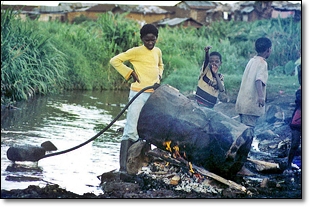NACADA Should Involve Stakeholders

 |
| Local gin "brewery" in Kenya Photo courtesy |
NACADA can draw lessons from the previous attempts to outlaw Changaa; instead of stemming its effects, it led to "kill-me-quick" strategies. Non formal brewers and their market segment developed a survival technique that ensured one consumed the drink quick enough and got drunk before the police caught up with them. The results were: blindness, violence, dysfunctional families and death. To ensure effectiveness of the Alcoholic Drinks Control Act, the authority ought to involved stakeholders so as to clean out emotive regulations and replace them with scientifically justifiable ones.
I read a piece in Business Daily that argued that if the alcohol laws are to be followed to the letter, then Hotel Intercontinental ought to shut operations simply because it is within the 300 meters radius to the Catholic Parochial Primary School. This perhaps illustrates the fact that it is not automatic that a Class 6 boy or girl will walk to Hotel Intercontinental and order for a quick shot of Vodka. The hotel class and ambience indirectly works against such an attempt.
It may be true in some situations that alcoholic outlets next to learning institutions may lead to underage drinking. But one ought to analyze other factors that may make an underage to take advantage of distance to a beer den. Such reasons can include the outlet management flouting the very NACADA rules not to sale to the under age. It may also be an indicator that the policing aspect very much required by the Act, is weak not to prevent such an eventuality. In a roundabout way, one can also argue that a beer outlet next to a learning institution might scare potential underage chaps from drinking for fear of meeting their supervisors in the same outlet.
In the quest to save Kenya from becoming a drunken nation with all its attendant negative effects, NACADA should actively involve stakeholders in drafting the laws to make the Act operational. Although "stakeholders" is a loose term, but the general concept is to allow NACADA to bring into focus other interoperating factors that lead to alcohol’s harmful effect. For example, an expanded informal brewing sector that commands almost 80% of Kenya's alcoholic drinks market share is due to pricing. The government had traditionally focused on formal brews to raise revenue and assumed that mere prohibition would stop consumption of Changaa.
It will be wrong to assume that simply having an Act of parliament in place will automatically get informal brewers to get hygienic and bottled alcoholic drinks to the market. Clear mechanisms to support informal brewers to scale up to expected standards ought to be explored.
Hospitality industry captains should take advantage of the window offered to streamline this noble regulation to amend proposed laws. Kenyans and brewers on the other hand ought not to surrender responsibility to NACADA; individual responsibility is the key to save a "drunken nation." Laws are formulated so as to enable each adult exercise high sense of responsibility as opposed to waiting for police.
By James Shikwati
The author james@irennkenya.org is Director of Inter Region Economic Network
